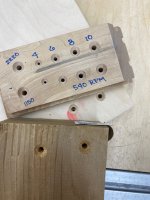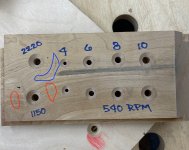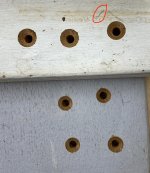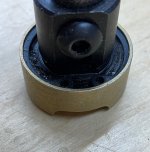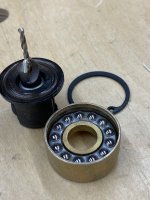Cheese
Member
Well that's not good Jonathan...Sure you're not running those at too high a RPM?
Here's an example of a #4 (55331), #6 (55228), #8 (55240) and a #10 (55242) in maple strip flooring at 540 RPM. I also tried the #10 in Baltic birch ply and a piece of cedar. No marks.
[attachimg=1]
I increased the speed to 1150 RPM on the maple and it left 2 short marks across from each other. Increasing the speed to 2220 RPM left a single mark about 1/3 around the c'sink.
I then tried the #10 on a primed cedar shingle reducing the speed to 540 RPM and it did not make a mark.
You want to countersink it until the outer ring just stops and then immediately lift the drill press handle.
[attachimg=2]
Here's an example of a #4 (55331), #6 (55228), #8 (55240) and a #10 (55242) in maple strip flooring at 540 RPM. I also tried the #10 in Baltic birch ply and a piece of cedar. No marks.
[attachimg=1]
I increased the speed to 1150 RPM on the maple and it left 2 short marks across from each other. Increasing the speed to 2220 RPM left a single mark about 1/3 around the c'sink.
I then tried the #10 on a primed cedar shingle reducing the speed to 540 RPM and it did not make a mark.
You want to countersink it until the outer ring just stops and then immediately lift the drill press handle.
[attachimg=2]

